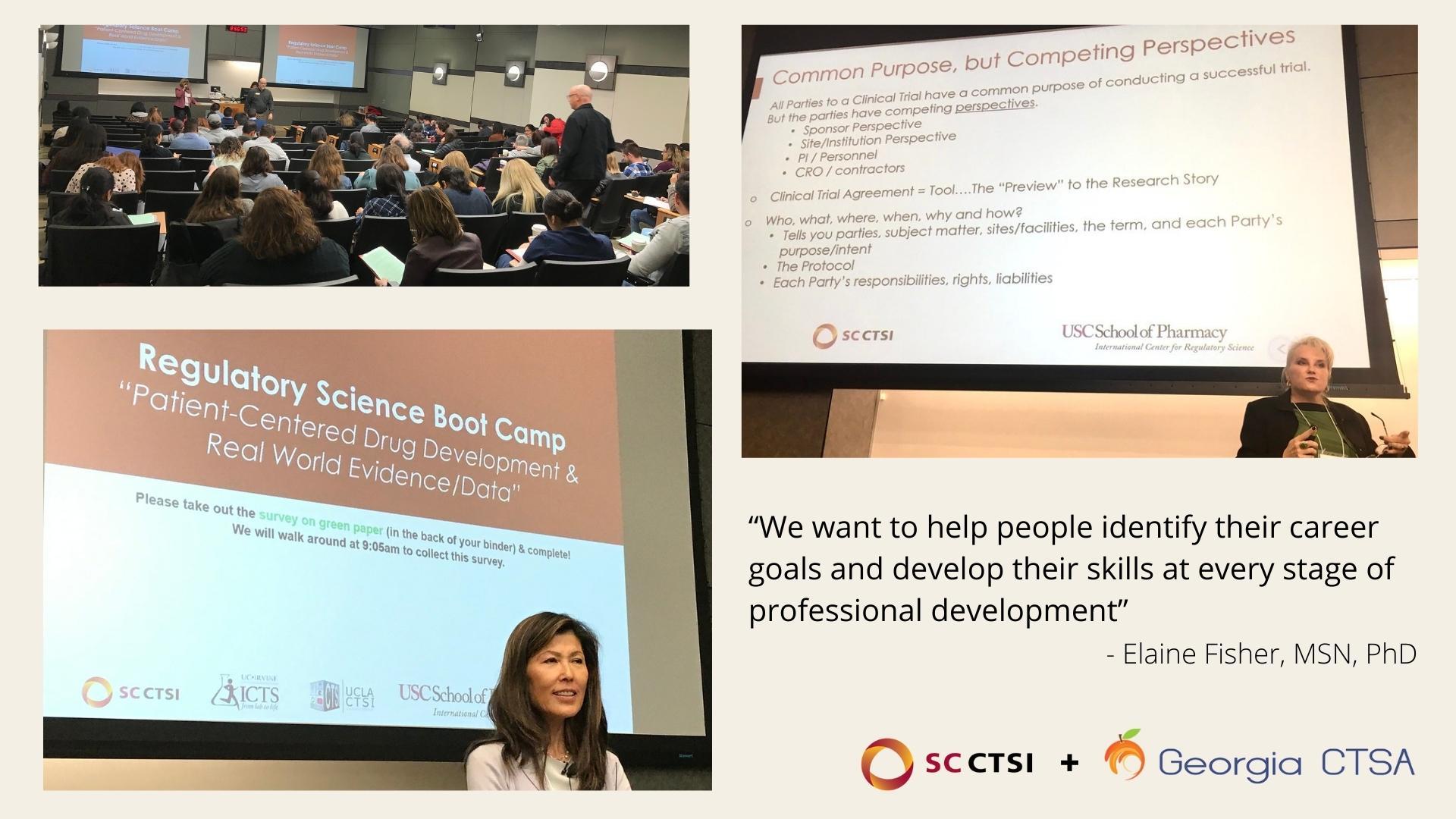SC CTSI and Georgia CTSA partner creating innovative career training and advancement platform

Navigating a career as a clinical research professional can be confusing and costly. High-quality practical training courses are often difficult to identify and behind expensive paywalls. Employers and PIs struggle to match crucial skills needed for research professional jobs with skills of a local workforce pool.
But a new program aims to change that.
Since 2020, the Georgia Clinical and Translational Science Alliance (Georgia CTSA) and the University of Southern California Clinical and Translational Science Institute (SC CTSI) have been collaborating on a venture called Empowering Purposeful Advancement of Careers and Training (EMPACT) program. The EMPACT training courses originated from topics presented in the Regulatory Science Symposia sponsored by the USC School of Pharmacy and the SC CTSI.
“Through our Regulatory Science Symposia, which is now in its fourth year, we have provided training to more than 1,800 clinical research professionals from 96 institutions,” said Eunjoo Pacifici, PharmD, PhD, Chair and Associate Professor, Department of Regulatory and Quality Sciences and Associate Director, DK Kim International Center for Regulatory Science at the USC School of Pharmacy. “We are delighted that our live training sessions can be transformed into enduring educational modules that can benefit a wider audience of clinical research professionals everywhere.”
The purpose of the training is to ensure consistency and availability of critical clinical research-related skills.
“We want to help people identify their career goals and develop their skills at every stage of professional development,” said Elaine Fisher, MSN, PhD, Director of Accreditation, Curriculum & Registration at the Nell Hodgson Woodruff School of Nursing at Emory University. “We are creating an individualized growth career navigation system that can guide someone who, for instance, wants to become a regulatory specialist or another job that requires more advanced skillsets,” Fisher said. “Our system allows you to set up an online profile that matches your abilities and experiences with a free catalog of training opportunities. Your profile can match your current skills, personal attributes and interests with available jobs under a nationally recognized competency framework. It allows you to look at yourself objectively and say, ‘Here are some areas that I’m not so strong in, but I can build myself up to reach the next level.’”
The EMPACT program is designed for the entire clinical and translational research workforce beyond formally trained faculty, trainees and fellows. Job categories include Clinical Research Coordinators, Project Managers, Monitors, Regulatory, Medical and Clinical Affairs Professionals or junior faculty with three-plus years of experience seeking to further develop clinical research conduct skills and principles.
Training courses address skills such as clinical trial start-up planning, mentoring and complex issues involving site management, study management, and sponsor/Clinical Research Organization challenges. By completing courses or programs, participants can gain contact hours recognized by a certificate and/or badge.
“We partnered with SC CTSI because it has probably the most high-quality training for clinical research professionals,” said Fisher. “SC CTSI trainings are most practical; they have good resources and references—and are free.”
EMPACT includes 50 courses approved for continuing education credits and career advancement by third-party professional accrediting providers at all career levels. EMPACT courses and programs are created by experts in cross-disciplinary fields such as instructional design, technology, workforce development, regulatory science, clinical and translational science and operations. Course offerings are vetted to ensure they are relevant, tailored to and appropriate for the intended audience.
Institutional trainers can use EMPACT to identify orientation needs for new employees and guide annual evaluations.
“EMPACT can help HR professionals write more accurate and detailed position descriptions,” Fisher said. “PIs are staying, ‘Stop bringing in people who are not qualified.’ It frustrates researchers to get applicants who have no relevant experience to the available positions.”
New PIs can also gain targeted training on the EMPACT platform. PIs are responsible for crucial clinical administrative responsibilities such as adverse event reporting that might not have been addressed in their previous research training. “The buck stops with the PI, so we will develop a series of programs on team science.”
Fisher envisions the EMPACT program going nationwide.
“We want EMPACT to be broadly disseminated for developing this entire workforce,” she said.



